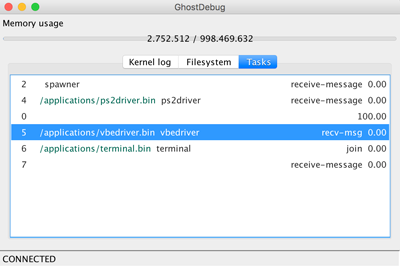0.5.0 - New scheduler & window server 2015/10/25, 18:25:09
*Wohoo!* The update is done. Took quite some time: it introduces changes in the kernel, a new scheduler, and also a rewrite of the window server. These had to be revised a lot - yet there are still some bugs (which are already being hounded). :-)
The new scheduler implementation is based on wait and run queues. The internal system call handler interface was refurbished and the handling cleaned up. Changing the scheduler required modifying some of the handlers, as they were implemented based on the assumption that the "current thread" given by the tasking facilities is consistent; with the new queue implementation, a task that is told to wait is immediately moved to the wait queue, thus being no more the _current thread_. A system call handler now gets the last executed thread passed as a parameter and can use it immediately (without asking the schedulers for the current thread). This will also help improve performance of some interprocess functions and made it possible to improve the idling of the scheduler.
The window server was completely rewritten and cleansed from the obsolete interface, and a new (variable-sized-messages) based interface was introduced. This simplifies communication a lot. The old windowmanager application is now obsolete.
Next things to do will be fixing a bug that freezes the window server for some reason and then extending the UI interface to make it possible to implement the first applications that actually have a working user interface.
